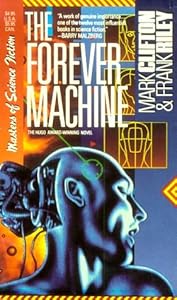Mark Clifton & Frank Riley
1954
Awards: Hugo
Rating: ★ ★ ★ – –
I have read several reviews of this book that call it trite and clichéd. But I generally enjoyed it.
The main character is a telepathic man, Joe Carter, who grows up ostracized and isolated because of his abilities; people are freaked out by the fact that he can tell what they are thinking. He doesn’t like being so lonely, so he becomes a brilliant scientist and invents a machine that can make other people into telepaths.

Everyone on earth theoretically has the potential to be turned into a telepath by Joe's machine. But it is next to impossible to be telepathic and to retain the judgmental natures most people have. Since telepaths know what everyone else is thinking, they have to be able to handle all the varied thoughts, good and bad, intentional and unintentional, that come into their heads, without prejudice. They have to be the most understanding, least judgmental people on earth.
Before it makes you telepathic, therefore, the machine strips out all your preconceived ideas about what is right and wrong and rebuilds you, cell by cell, from the ground up…
…and it turns out that this has the nice side effect of making old people young again. Which means that once the machine has been run on its first person, an elderly woman, and she is transformed back into a beautiful twenty-year-old, everybody else on earth wants to do it.
The catch is that the machine won’t work on anybody who is convinced that they are absolutely right about something. If you are not flexible enough to be removed of all your assumptions and prejudices, then you will come out of the machine physically and mentally unchanged.
The first third of this book, which I liked the most, tells the story of Joe's childhood. As a young boy, he instinctively reacts not to what people are saying but to what they are really thinking--which, of course, makes everyone think he is crazy. He learns, painfully, that it is best to disguise the fact that he can read minds.
In the second third of the book, which was still okay, Joe grows up and goes to college and teams up with two professors to create the telepath-making machine. Throughout the project the three of them are alternately reviled and revered by the public, because the public is both terrified of what the machine means and also greedy for it. Eventually popular opinion turns totally against them; they become the target of a witch hunt and have to go into hiding.
In the last third of the book, however, after the machine has actually been built and its three creators start doing demonstrations of the machine for the public, the book loses its way. It becomes far too heavy-handed in its lesson about how we all need to be more flexible and realize that we’re not always right. I was also very dissatisfied with their solution for what to do with the machine in the end.
An earlier version of this review originally appeared on Cheeze Blog.
No comments:
Post a Comment